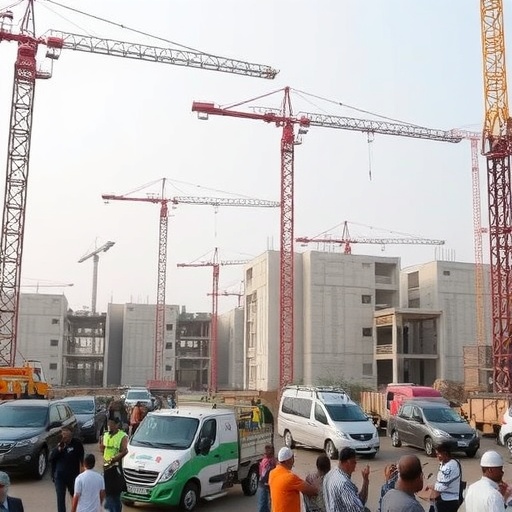In a rapidly urbanizing world, the construction sector is at the forefront of both opportunity and challenge. This industry is responsible for a significant portion of global material waste, which has profound implications for sustainability. Recent research conducted by Ghoneim, Halabya, and Moussa sheds light on the drivers of material waste in Egypt’s construction sector and seeks to identify pathways for sustainability. This groundbreaking study not only uncovers the root causes of waste but also proposes actionable strategies aimed at mitigating its impact, an issue that resonates globally.
Construction is inherently resource-intensive, necessitating a broad array of materials that must be sourced, transported, and installed meticulously. However, the process is fraught with inefficiencies that lead to excessive waste generation. The researchers identified that one of the primary drivers of material waste in Egypt revolves around poor project planning and management. The lack of foresight in project execution often results in miscalculations regarding required materials, which in turn exacerbates waste levels. Such inefficiencies not only inflate project costs but also contribute to environmental degradation, urging a need for re-evaluation of processes involved.
Moreover, the study emphasizes the role of traditional construction practices that have remained unchanged for decades. Many contractors and workers still rely on outdated methods, which tend to generate more waste than modern, systematic approaches. For instance, the prevalent use of brick as a primary building material often leads to substantial off-cuts that end up as waste. This observation highlights a critical disconnect between available practices and the need for a paradigm shift towards innovation in material usage within the construction sector.
In addition to these practices, the researchers pointed out the impact of limited training and resources available to workers in the construction field. Many laborers lack the knowledge regarding efficient material handling and waste reduction techniques. This gap in education further exacerbates the issue of material waste, suggesting that comprehensive training programs could serve as an effective strategy to enhance not only skills but also awareness about sustainability.
Ghoneim and colleagues also examined the financial constraints faced by many firms operating in Egypt. Tight budgets often mean that stakeholders prioritize cost over sustainability, leading to subpar decision-making processes. This vicious cycle perpetuates a system where waste is not only tolerated but becomes an unintentional byproduct of cost-cutting measures. By addressing financial barriers and emphasizing the long-term economic advantages of sustainable practices, a more sustainable construction ecosystem could be realized.
In exploring sustainability strategies, the researchers advocated for the adoption of circular economy principles. The integration of circular systems involves designing waste out of the construction process altogether, which can drastically reduce overall material consumption. Embracing innovations such as material reclamation and recycling would encourage stakeholders to think beyond traditional resource extraction methods and consider the lifecycle of materials. The potential of reusing materials could also create economic advantages, especially in a region where resources are limited.
The involvement of construction stakeholders in waste management strategies emerged as another crucial factor. By facilitating collaboration between government bodies, private firms, and educational institutions, a united front can be established against material waste. This linkage can foster shared resources for waste reduction initiatives and increase buy-in for sustainability efforts hitherto marred by misunderstanding or lack of urgency.
Additionally, the study underscored the importance of policy interventions aimed at promoting sustainable practices within the Egyptian construction sector. The researchers highlighted the necessity for the government to establish stringent regulations governing waste management. By implementing standard guidelines and incentivizing sustainable practices, the Egyptian government could catalyze significant shifts in corporate behavior. Such policy initiatives could set a precedent for other countries grappling with similar challenges in the construction industry.
Furthermore, public awareness plays a pivotal role in advancing sustainability initiatives. The study advocates for community engagement and educational programs that raise consciousness regarding the environmental impacts of construction waste. By fostering a culture of sustainability at the grassroots level, the construction industry can tap into broader societal support and forge pathways toward more responsible development practices.
Additionally, the research implicates technology as a game changer in reducing construction waste. Embracing digital tools such as Building Information Modeling (BIM) could significantly improve planning and execution throughout the construction project lifecycle. These modern technologies enable precise modeling of projects, predicting materials needed and facilitating real-time waste tracking. Such advancements could narrow the margin of error prevalent in traditional methods while enhancing accountability and efficiency among contractors.
The implications of such research extend beyond the bounds of Egypt. The findings can reverberate across global construction practices, providing a model for other nations grappling with their waste management challenges. The emphasis on sustainable practices is not merely an optional endeavor but has become a pressing necessity for the survival of our planet in the face of climate change and environmental degradation.
In conclusion, the empirical assessment conducted by Ghoneim, Halabya, and Moussa illuminates critical insights into the material waste drivers in Egypt’s construction sector, along with sustainable strategies for mitigating their effects. While the study exposes the underlying issues of inefficiencies, outdated practices, and financial constraints, it also highlights the transformative potential of policy interventions, circular economy principles, collaboration, technological adoption, and public awareness. As the construction industry forges ahead, the imperative for a sustainable future can no longer be an afterthought but must be ingrained within the regulatory and operational fabric of construction practices worldwide.
Subject of Research: Material waste drivers and sustainability strategies in Egypt’s construction sector
Article Title: An empirical assessment of material waste drivers and sustainability strategies in Egypt’s construction sector.
Article References:
Ghoneim, M., Halabya, A., Moussa, O.M. et al. An empirical assessment of material waste drivers and sustainability strategies in Egypt’s construction sector. Discov Sustain 6, 1154 (2025). https://doi.org/10.1007/s43621-025-01976-2
Image Credits: AI Generated
DOI:
Keywords: material waste, sustainability, construction sector, circular economy, policy interventions, Egypt.




